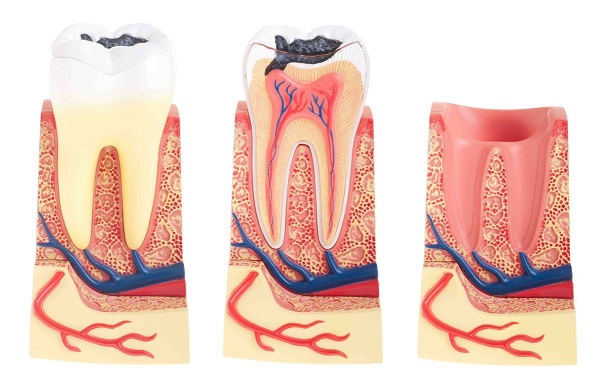A number of dental difficulties have as a common theme the invasion of infecting agents into your mouth. Here, we discuss one that not always manifest itself as a problem. A dead nerve in tooth is often another name for a dead tooth altogether. Below, we explain what is a dead tooth and nerve, its causes, its effects, how you can treat it or its resulting complications, and how you might best avoid it.
What Is a Dead Nerve in Tooth?
When you have a dead tooth, the pulp has ceased supplying blood to it. From that fount of blood comes the capacity you have to feel temperatures and other sensations. That blood stimulates the nerves that make your teeth and mouth feel warm or cold. Nerves in your teeth perform only sensory functions. When your tooth dies, you also get a dead nerve in tooth. That results in a loss of sensation to warm or cold temperatures. It does not affect how your teeth function.
Your pulp also contains nerve and tissue that connects the tooth to ultimately the jaw bone. Herein lies the seriousness of having a dead tooth. Specifically, the trouble comes in the main causes of a dead tooth.

What Causes a Tooth to Die?
A cavity can lead to or represent the initiation of tooth decay, a primary culprit of a dead tooth and dead nerve in tooth.
Cavities are open spaces created when a tooth lacks any cap. You might notice one if the tooth feels sensitive to cold air. As the cavity persists, bacteria enters and starts its infecting work. Additionally, sugar, salt, and food enter into the deep, open area and can further foster the generation of bacteria and plaque.
The progressive tooth decay then attacks and eventually destroys the nerves and the pulp. The affected tooth then loses the other benefits of the pulp, which are the flow of blood and its support structure. Eventually, the tooth will fall from your mouth.
In addition to tooth decay, trauma or injury to the tooth can also kill the nerves. Events such as impact during sports events, an accident, or an assault may burst the blood vessels or obstruct the flow of blood.
Dead Tooth Symptoms
You might expect there to be no pain associated with a dead tooth nerve. For many, this very well is the case.
Others with a dead tooth feel the pain, which can reach excruciating heights. This pain comes not from the pulp, but from nerve endings around the periodontal membrane. From this outside layer around the tooth forms the protection of extremely sensitive nerve endings. Exposure of those ends signals that your tooth may have reached its death. You may especially experience pain when you chew or otherwise move your jaw.
Pressure on the periodontal membrane also provides a source of pain. Accumulation of bacteria and the nerve cells apply the pressure to the membrane.

The infection arising out of the causes of the dead tooth leave other signs as well, such as:
- Bad taste and smell in the mouth
- Swelling
- Pimples on the gums
- Discolored tooth, especially turning gray, yellow, or black. The transformation of teeth to these colors indicates that the cells are dying.
Dead Tooth Treatment
The normal options for dead tooth treatment are both surgical.
Your dentist may extract, or pull, the tooth. If your teeth are cracked or otherwise damaged, extraction will be the recommended and likely course. Should the dentist conclude that your tooth can be saved, you’ll likely get a root canal. Its reputation notwithstanding, root canals generally do not create more pain than other procedures. In fact, you may need only numbing rather than anesthesia, because the nerves are dead.
In stage one, the dentist or oral surgeon will drill a hole into the affected tooth. From this canal, the draining of bacteria, particles, and the infection occurs. After perhaps a few days, you’ll return for sealing or filling of the area. The dentist or endodontist wants that interim between drilling and filling to allow clearing of the infection from the abscess. During that time, you might get a temporary filling.
Dead Tooth Prevention
Dead tooth prevention, or at least a reduction of the risks, means avoiding the causes as much as possible.
Poor dental habits represent a common cause of dental problems, including dead teeth. These practices will help you lower the chances of the infections that trigger death teeth, abscesses, and more serious conditions:
- Brush your teeth after meals, especially after you last eat or drink a beverage for the day
- Floss daily
- Limit your intake of candy and sugary foods or beverages. Hard or sticky candy, in particular, may stick to teeth or tight openings, gaps, or the crowns of teeth.
- Use antiseptic or disinfectant mouthwash, as this can attack the bacteria that may trigger infections. To save money, consider homemade mouthwash such as those in which you add 20 drops of an essential oil (such as cinnamon, peppermint, tea tree, or clove) into a cup of water. Myrrh gum also cleans infections and helps counteract inflammations.
- If you play sports, be sure you have protective gear for your mouth. Depending on the sport, this may include a helmet when you’re at the plate, a strapped helmet in a football game, or a mouthpiece.
Conclusion
Don’t ignore a painful sensation or foul taste and smell in your mouth. It could actually signal a dead nerve or tooth and the potential of more ominous oral disease. Find a dentist promptly. If you have experienced a dead nerve in tooth, please let us know how you handled it in the comments section below.

Leave a Comment